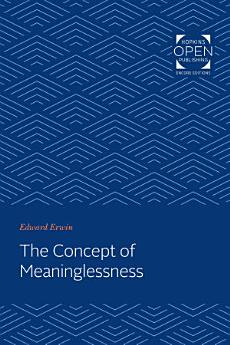The Concept of Meaninglessness
Acerca de este libro electrónico
Professor Erwin, in a systematic study of the concept of meaninglessness, begins by examining the standard criteria of meaninglessness proposed by philosophers. These criteria include operationalist, verificationist, and type or category criteria. Each of these criteria, he argues, is inadequate. Erwin then turns to the question, What kinds of items, if any, should be said to be meaningless? Most philosophers concerned with this question have claimed that only sentences, not statements or propositions, can be meaningless. Erwin argues, however, that this is wrong: statements (and propositions) can be meaningless. Once this is demonstrated, it can then be shown that the more radical skepticism about the philosophic use of the concept of meaninglessness is misguided. In particular, Erwin shows that the following assertions of the radical skeptic are false: that what is meaningless is relative to a given language or to a given time, and that the concept of meaninglessness forces us to condemn as nonsense metaphors comprehensible to competent speakers of English.
In his concluding chapter, Erwin considers the implications of there not being any adequate general criterion of meaninglessness. He then tries to show how the concept of meaninglessness, when interpreted in the manner he suggests, can be profitably used by philosophers, despite the many persuasive objections to its use that philosophers have raised in their disputes over it.
Acerca del autor
Edward Erwin is a professor of philosophy at the University of Miami. He has also authored Behavior Therapy: Scientific, Philosophical, and Moral Foundations; A Final Accounting: Philosophical and Empirical Issues in Freudian Psychology; and Philosophy and Psychotherapy: Razing the Troubles of the Brain.






